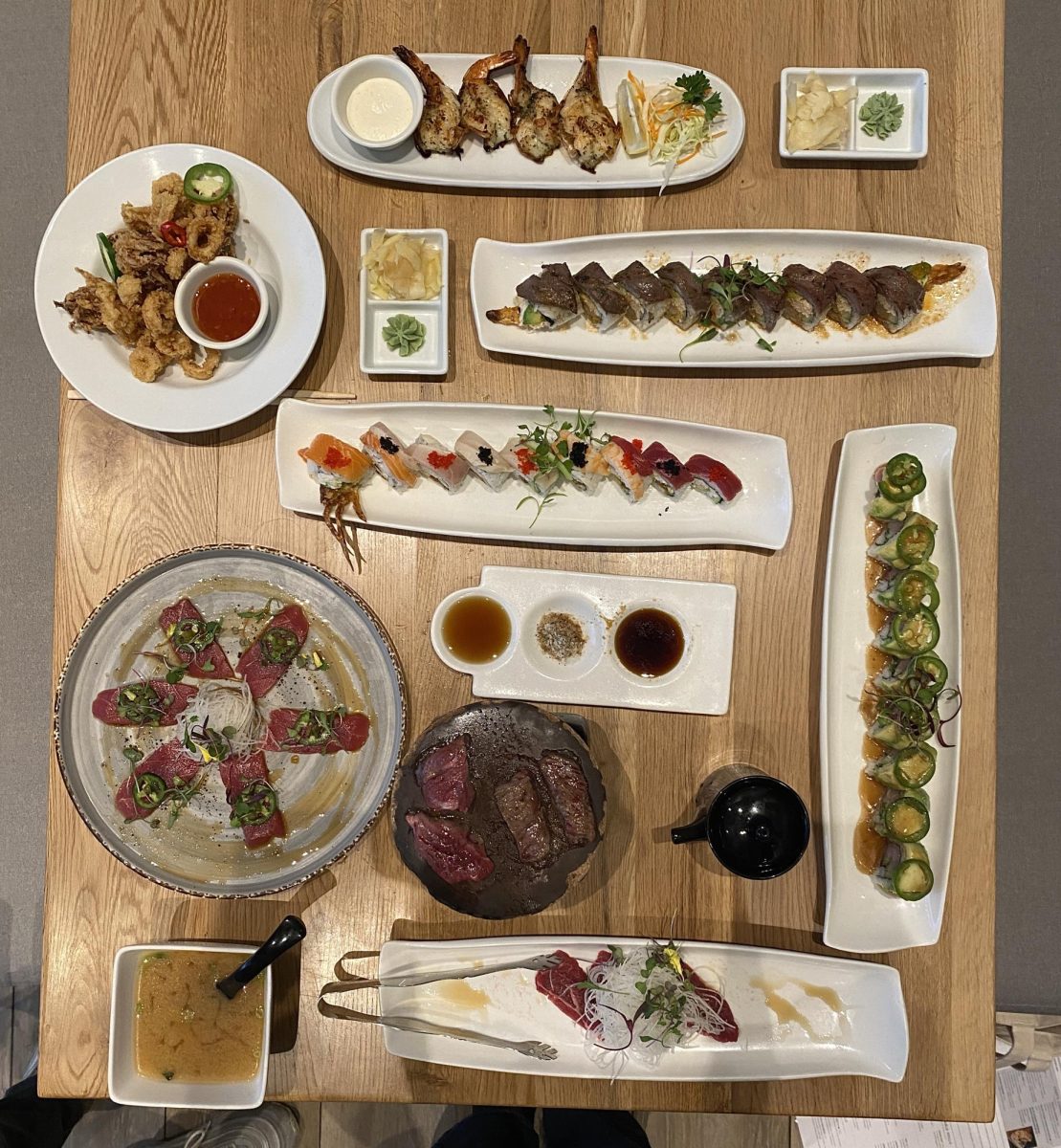A&E’s Picks for AAPI Heritage Month
May 15, 2022
There’s a lot to celebrate during AAPI Heritage Month, part of that being the art and media to come from Asian and AAPI creators. Here are some of our picks.
“Excuse Me, Miss, Miss, Miss”

Magical realism meets a harrowing reality in Sonny Calvento’s short film “Excuse Me, Miss, Miss, Miss.” Vangie, a dejected sales lady played by Phyllis Grae Grande, confronts her employer after being reprimanded for her lackluster work performance. What follows is a deeply satirical critique of contractual labor in the Philippines and Western capitalist institutions. Vangie works at Trendysitas, a fictionalized Filipino department store whose company jingle — “dying to serve” — acts as both an earnest declaration of quality customer service and portentous warning for the contractual laborers it employs. When Vangie shows up on her boss Ma’am Charo’s (Angelina Kanapi) doorstep, the full extent of exploitation at Trendysitas is made clear: Ma’am Charo is not the inexhaustible and formidable boss Vangie once perceived, but an impossible, fantastical trinity of three identical Ma’am Charos. Chaos ensues as Vangie desperately attempts to convince her coworkers of their boss’ deceit and mystical background.
As the Philippines reckons with the contentious results of its most recent presidential election, issues of exploitation are at the forefront of political discourse. Under outgoing president Rodrigo Duterete, contractual laborers in the Philippines are offered a permanent position after six months of employment. This precarious policy, however, is conducive to unfair labor practices: even the most stellar employees are fired so that large corporations can avoid offering positions with higher pay. Despite its roots in the supernatural, “Excuse Me” is a universal tale for Filipino workers; corruption begets corruption, perpetuating an endless cycle of exploitation in the workplace.
As the first Filipino short film to compete at the Utah-based Sundance Film Festival, “Excuse Me” is placed directly at the convergence of American and Asian ideologies. Calvento’s work is in part dictated by the importation of Western economic and value systems, though “Excuse Me” offers a subversive lens through which to view capitalist development in Southeast Asia. “Excuse Me” is ultimately a short film composed of dichotomies: magic and realism, justice and injustice, East and West.
– Sarah Delima, Senior Staff Writer
“Mahal” – Toro y Moi

In a recent interview with celebrity music critic Anthony Fantano, Chaz Bear, also known as Toro y Moi, confessed that “Mahal” was his first attempt at a concept album. On first listen, listeners might not understand exactly how this album is, well, conceptual. It’s not until one connects the staticky motif of station changes peppered throughout the album with the Jeepney on the cover of the album that one realizes what this project is: a journey through Bear’s Filipino heritage. The Jeepney depicted on the cover serves as both a physical and metaphorical vehicle, transporting listeners from the warm, fuzzy soundscape of the album to the highly stylized music videos for “Postman” and “The Loop,” in which Bear has managed to build his own little bubble universe. The video for “Postman” stands out in particular as a celebration of Filipino-American culture, complete with balikbayan boxes and Filipino sun hoodies.
“Mahal” sees Bear return to the guitar-centric rock sound fans were first introduced to in “What For.” In the same Fantano interview, the Filipino-American artist states that he was reluctant to return to the psych-rock sound, given that fans had already heard it.
“I just wanted to, like, show awareness that, yes, this is another guitar Toro record,” Bear said. “‘What For’ wasn’t a phase — and neither is ‘Mahal’ — but I do want them to sort of be connected … in the Toro storyline.”
In other words, yes, it’s a familiar sound for Bear, but it’s not a retread. “Mahal” is not only an expression of Toro y Moi’s multifaceted identity; it’s a sonic and aesthetic exploration of the ways in which Bear’s experiences and personal histories all connect to form a uniquely personal cultural and artistic identity.
– Elias Roman, A&E Editor
“Dust and Conscience” – Truong Tran

Our perceptions of reality can be shaped by the language we use to process, express, and share it with others. What happens when language is not enough to arrive at the exact emotion we hope to convey? Or, is language arbitrary if the meaning is generally understood? In “dust and conscience,” Truong Tran examines the role of language in rebuilding a sense of identity for Asian American immigrants, and for Vietnamese immigrants in particular. To explore identity, Tran magnifies the moments in between “life” and “living” when the body is still, and the mind retraces the body’s past and entertains what could have been. Throughout the collection, Tran discusses how Asian American immigrants use stories and rituals to reestablish a sense of “home.”
Each poem is short and devoid of any punctuation, creating an alluring one-sitting read. While sometimes frustrating, Tran’s lack of punctuation lends to his exploration of recreating language and meaning through personal experience. Tran seems to emphasize the weight of individual words and to encourage his readers to consider multiple interpretations of each poem. He provides the reader with space, as shown in the physical emptiness of each page, for the misconstruance of words that are recognizable to English speakers, but become foreign without expected indicators like punctuation. In doing so, Tran nods to the experience of many immigrants who work to untangle new rules that American-born citizens know as “common sense.” The contained block structure of Tran’s poems mimics the suffocating discomfort that many Asian immigrants experience in America. The sense of discomfort created by the structure and lack of punctuation simulates in the reader a yearning for the familiarity of “home” that is similar to that felt by Asian immigrants. With only page breaks to indicate the beginning of a new piece, the poems flows into one another, forming a collage of fragments of Tran’s ethnic, sexual, and religious identity, in congruence with his ancestral history.
In his poetry collection, Tran dissects the practice of redefining language and its connection to an understanding of self and family in a way I am still working to comprehend. Perhaps that is why I feel compelled to track Tran’s poetic structure in order to inform my understanding of his poetic content. On the whole, “Dust and Conscience” led me to search for the beginnings of integral fragments of my identity that exist within and beyond my lifetime, making me more empathetic to the generations before me.
– Xuan Ly, Contributing Writer
“Afterparties” – Anthony Veasna So

“Afterparties” is a collection of short stories revolving around Cambodian-American characters living in Stockton, California. Some of them are related, some are not, but there exists throughout the novel a feeling that all these stories and lives occupy the same universe. Its late author Anthony Veasna So loosely based some of the characters on his own experiences growing up in Stockton, giving the work a deeply intimate feeling, like watching a friend recall and ponder on past memories that you were not there for.
“Afterparties” is a lot of things. It’s a love letter to Stockton, though at times also a rejection of the city. It’s a love letter to family and friends, but also a deep examination of generational trauma and the rift between first-generation kids and their immigrant parents. Above all though, it’s an honest and sincere collection of literature that is sure to leave readers with a deeper appreciation for the mundane — hometowns, family, and friends. I’d previously written about “Afterparties” for another column in The UCSD Guardian, which should tell you how much I think this book is worth reading. So, do yourself a favor and take a walk through Cambodian Stockton, California; Veasna So won’t disappoint you.
– Elias Roman, A&E Editor
“a liquid breakfast” – Audrey Nuna

Audrey Nuna’s 2021 album, “a liquid breakfast,” begins with an assertive beat that calls attention to herself and her art. As the album progresses, Nuna continues to establish aspects of her identity as a Korean-American woman within the R&B and hip hop genre. Nuna’s already vibrant energy is further fueled by the prominent heartbeat and sonic textures found in each song. Largely written during the pandemic, Nuna’s album reflects on isolation and letting go of societal expectations to find what truly matters to her. In doing so, she often returns to the idea of personal freedom which is intrinsically linked to self confidence.
In tracks like “damn Right” and “Cool Kids,” Nuna focuses on the importance of self empowerment as an Asian woman in a predominantly male dominated genre. Despite the frequent stream of judgment and gossip, Nuna maintains a distinctive swagger that is evident throughout “a liquid breakfast.” Her satirical lyrics in “damn Right” comment on the skewed assessment of value during the creation of one’s public image; she openly admits the material counterfeits in her appearance, demonstrating an honesty that is consistent throughout the album. Nuna’s infectious sense of weightlessness is compounded by references to her childhood like Pokémon, fast food, pop culture, and even the inclusion of a voicemail from her grandmother. Korean tradition and family is also a large source of Nuna’s inspiration; this includes the stage name Audrey Nuna, which is the name her younger brother calls her, meaning “older sister Audrey.”
In the second half of her album, Nuna reveals more intimate realities of her adolescence like past relationships, drugs, dropping out, and the role of religion in her life. Even with lighter overtones, Nuna is able to touch on the detrimental impacts of constant stimulation, whether from social media or her own tendency to hyperfocus on creating art. Her songs “Space” and “Long Year” feature slower and more ethereal beats where Nuna repeats a few key phrases, then simply lets the music speak for her.
Throughout the album, Nuna seamlessly transitions from fast-paced flows to a more melodic vocal range as she expresses her personal growth. Listening to “a liquid breakfast” encourages me to prioritize myself and the discovery of my own style, a practice that many Asian women are not given space to do. Audrey Nuna’s musical and visual manifestations of her thoughts are a source of empowerment for Asian women to break from the stereotypes that homogenize individuals.
– Xuan Ly, Contributing Writer
“Everything Everywhere All at Once”

Cinematic universes have been a large part of the cultural zeitgeist for the better part of the last decade thanks to Marvel. Recently though, there appears to be a new hot trope in cinema: the multiverse. “Everything Everywhere All at Once” released March 30, 2022, just a week before “Doctor Strange in the Multiverse of Madness,” and has managed to hold steady against the behemoth that is the Marvel Cinematic Universe.
The story follows Evelyn Wang (Michelle Yeoh) as she struggles to keep her failing laundromat business afloat and her family together. Simple, right? Well, in her journey to achieve these two things, Evelyn must also fight an interdimensional being, drawing skills and abilities from all the different versions of herself that exist throughout the multiverse. Watching the film, viewers will get the sense that the film is aware of how ridiculous its premise is, but it works. The juxtaposition of the surreal action and the heartfelt moments between characters makes the latter hit that much harder. It’s a film that doesn’t take itself too seriously, but knows when to pull back (most of the time). More importantly though, “Everything Everywhere All at Once” is a film about the immigrant experience, and the disorientation that comes with adapting to the laws of an unfamiliar and strange place.
– Elias Roman, A&E Editor
“Typical of Me” – Laufey

Laufey modernizes fireside jazz in her EP “Typical of Me.” With just seven tracks, including a reimagining of the classic jazz ballad “I Wish You Love,” Laufey traverses through different processes of healing and the spiral of longing. Laufey’s warm voice and effortless vocal scatting layers to create a fairytale-esque space for Asian-American girls to feel wholly lovable in a way that American media often neglects.
Her EP begins with “Street by Street,” a strong reclamation of self through the examination of emotions attached to physical location. Laufey’s voice floats over the brightly punctuated beat as she tours her hometown, exploring the memories attached. “Street by Street” marks a shift in mindset that solidifies distance between herself and her past relationship that ultimately allows her to return to her past in order to heal. Even as Laufey dives into her darker mindspace, the entrancing piano, cello, and trumpet accompaniments maintain a whimsical air that keeps listeners at ease. Laufey captures her audience with lyrics that convey the all too familiar feelings of insecurity, desire, and a fragile sense of peace in the aftermath of love. In songs like “Like the Movies” and “Someone New,” she comments on the effect of media on perceptions of love that are simultaneously damaging and inspiring, in turn emphasizing the importance of Asian representation in media. Laufey paints a world out of her daydreams that is piercingly relatable, yet remains grounded in reality through the inclusion of everyday sounds like chirping birds. She takes her time in each song, allowing each component to shine, and providing space for her art to sit with her listeners.
“Typical of Me” ends with an ode to Laufey’s best friend and twin sister, Junia, reminding her listeners of the beauty of platonic and familial love. There is a clear sense of growth and movement across the seven songs that exude a happiness that is contagious. Laufey’s smooth alto tone and soulful instrumental makes for a meditative listen that serves as a perfect entrance into jazz.
– Xuan Ly, Contributing Writer
Images courtesy of Nicholas Regli, San Diego Asian Film Festival, Kearny Street Workshop + Amazon, Los Angeles Times, NME, Creative Bloq, and Diandra Reviews It All
















Tif • Jul 28, 2022 at 7:49 pm
For mailings, I wanted to identify a reliable consumer base. I could then alert a large number of individuals at once to promotional offers for our goods. I am aware that this is more important than ever for many people in sales. I may suggest that you use this website GetProspect bulk email verifier getprospect.com/email-verifier/bulk-email-verifier , to get corporate email addresses in bulk. Since I accomplished that myself, I was pleased with the outcome. I’m hoping you’ll find it useful as well. Making a good search for emails is quite helpful right now, and getting this information promptly is very crucial.
malcolm • Jan 11, 2024 at 5:30 am
this is very interesting